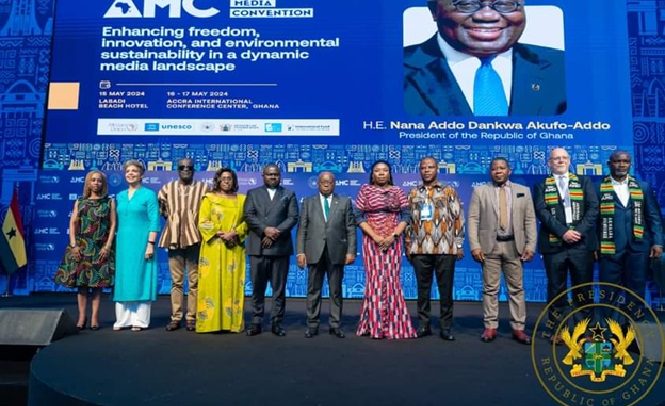President Akufo-Addo with some of the guests at the closing ceremony of the Africa Media Convention in Accra
President Akufo-Addo has stressed the need for the media to uphold integrity and ethical standards which give credence to the dignity of all individuals.
Whilst he admits that accuracy was an important element of their work, he said they must strive to put integrity and ethical standards high on the pedestal.
Speaking at the closing ceremony of the Third African Media Convention (AMC) in Accra on Friday, May 17, 2024, he underscored the need for the African media to take a proactive role in educating the public on climate change issues, especially among the youth, to promote environmental sustainability.
He said it was imperative for the media to mobilise the people towards a collective action, drive innovation and promote sustainable environmental practices on the continent.
The three-day Convention is on the theme, ‘The African Media We Want: Enhancing Freedom, Innovation, and Environmental Sustainability in a Dynamic Media Landscape’.
That, he said, was because the freedom of the media was fundamental to the growth and development of any democratic society.
The event brought together about 2,000 participants across the continent, including policymakers, Ministers of State, academicians, researchers and media practitioners.
The AMC is an annual conference providing a platform to reflect on the fundamental role of journalism on the continent, celebrate the fundamental principles of press freedom, and deliberate on measures to safeguard media freedoms.
The inaugural Convention took place in Arusha, Tanzania in 2022, followed by a successful second gathering in Lusaka, Zambia in 2023.
The forum also focused on promotion of access to information, the safety of journalists and media viability in the African Union member States.
It was hosted by the Ministry of Information, the Ghana Journalists Association, and various media partners.
Stakeholders are expected to collaborate to develop an action plan and advocate policies that foster a free, vibrant, and impactful press across the continent.
President Akufo-Addo highlighted some legislations and interventions that helped to promote press freedom in Ghana, including the repeal of the infamous criminal libel law in January 2001 and the enactment of the Right to Information Act in 2019.
Those interventions, he explained, had made a positive impact on the development of Ghanaian media, freeing it from unnecessary self-censorship and promoting critical media culture in the country.
He added that these laws also contributed to the growth of a vibrant media, and significantly helped to deepen the country’s democracy,.
To enhance public accountability as a strategic goal on public policy, the President said, his government enacted the Right to Information Act, as a major step in deepening the country’s democratic agenda, providing the citizens with essential content and ensuring an accountable governance.
The impact of media freedom, he noted, had improved the quality of projects and fostered the culture of transparency.
For this reason, he said, Ghanaians were able to freely interrogate government’s actions, policies and programmes.
“The Ghanaian media is ranked as one of the top countries in the Global Press Freedom Index. Today, the media stands at the crossroads of present challenges and opportunities.
“As we navigate the complexities, the media’s role becomes even more useful, not just as a guardian, but as a catalyst for sustainable development and innovation,” the President observed.
President Akufo-Addo said the freedom of the media was fundamental to the growth and development of any democratic society in Africa.
However, he said, that freedom should not merely be the ability to speak or write freely, but also the power to inform and mobilise society for a common goal.
Therefore, it was crucial for the media to uphold not just accuracy, but also integrity and ethical standards that respect the dignity of all individuals.
By Charles Takyi-Boadu, Presidential Correspondent

